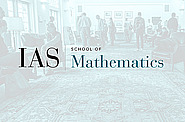Seminars Sorted by Series
Special Year Learning Seminar
Apr
18
2024
Apr
25
2024
Oct
08
2025
Oct
22
2025
Oct
29
2025
Nov
05
2025
Nov
12
2025
Nov
19
2025
Dec
03
2025
Special Year on Conformally Symplectic Dynamics and Geometry
Special Year Research Seminar
Oct
04
2022
Special Year Research Seminar
On Recent Developments in Pointwise Ergodic Theory
2:00pm|Simonyi 101 and Remote Access
Oct
04
2022
Special Year Research Seminar
Sparse Distribution Problems for Some Dynamical Systems
Adam Kanigowski
3:30pm|Simonyi 101 and Remote Access
Oct
11
2022
Special Year Research Seminar
Some Small Progress on the Mizohata-Takeuchi Conjecture
Marina Iliopoulou
2:00pm|Simonyi 101 and Remote Access
Oct
18
2022
Special Year Research Seminar
Linear Equations in Smooth Numbers
Lilian Matthiesen
2:00pm|Simonyi 101 and Remote Access
Oct
18
2022
Special Year Research Seminar
Word Width in Higher Rank Arithmetic Groups
4:00pm|Simonyi 101 and Remote Access
Nov
01
2022
Special Year Research Seminar
Sets With Small $l^1$ Fourier Norm
Thomas Bloom
2:00pm|Simonyi 101 and Remote Access
Nov
08
2022
Special Year Research Seminar
Deviation Spectrum of Ergodic Integrals for Locally Hamiltonian Flows on Surfaces
Krzysztof Fraczek
2:00pm|Simonyi 101 and Remote Access
Nov
08
2022
Special Year Research Seminar
Measure Growth in Compact Simple Lie Groups
Yifan Jing
3:30pm|Simonyi 101 and Remote Access
Nov
15
2022
Special Year Research Seminar
Rigidity of Kleinian Groups via Self-Joinings
2:00pm|Simonyi 101 and Remote Access
Nov
22
2022
Special Year Research Seminar
Almost all Dynamically Syndetic Sets are Multiplicatively Thick
Daniel Glasscock
2:00pm|Simonyi 101 and Remote Access
Dec
06
2022
Special Year Research Seminar
Products of Primes in Arithmetic Progressions
2:00pm|Simonyi 101 and Remote Access
Dec
13
2022
Special Year Research Seminar
Exponential Mixing and Fractal Uncertainty
Osama Khalil
2:00pm|Simonyi 101 and Remote Access
Dec
13
2022
Special Year Research Seminar
Toward Classifying Reducts of the Complex Field
Chieu-Minh Tran
4:00pm|Simonyi 101 and Remote Access
Jan
17
2023
Special Year Research Seminar
On Furstenberg Systems for Some Aperiodic Multiplicative Functions
2:00pm|Simonyi 101 and Remote Access
Jan
24
2023
Special Year Research Seminar
The Erdős-Szekeres Problem in Three (and Higher) Dimensions
2:00pm|Simonyi 101 and Remote Access
Jan
31
2023
Special Year Research Seminar
Non-Rigidity of Horocycle Orbit Closures in Geometrically Infinite Surfaces
Or Landesberg
2:00pm|Simonyi 101 and Remote Access
Feb
07
2023
Special Year Research Seminar
Infinite Partial Sumsets in the Primes
2:00pm|Simonyi 101 and Remote Access
Feb
14
2023
Special Year Research Seminar
Incidence Theory and Uniform Distribution in Higher Dimensions
Alex Iosevich
2:00pm|Simonyi 101 and Remote Access
Feb
21
2023
Special Year Research Seminar
Restriction of Exponential Sums to Hypersurfaces
2:00pm|Simonyi 101 and Remote Access
Mar
07
2023
Special Year Research Seminar
Homogeneous Structures in Subset Sums and Non-averaging Sets
David Conlon
2:00pm|Simonyi 101 and Remote Access
Mar
07
2023
Special Year Research Seminar
Some Inverse Theorems in Ergodic Theory and Additive Combinatorics
3:30pm|Simonyi 101 and Remote Access
Mar
14
2023
Special Year Research Seminar
Geometric Representation of Structured Extensions in Ergodic Theory
Henrik Kreidler
2:00pm|Simonyi 101 and Remote Access
Mar
21
2023
Special Year Research Seminar
Unbounded Fast Escaping Wandering Domains
Adi Glücksam
2:00pm|Simonyi 101 and Remote Access
Mar
28
2023
Special Year Research Seminar
On the Maximum of a Twisted Divisor Function
Dimitris Koukoulopoulos
2:00pm|Simonyi 101 and Remote Access
Mar
28
2023
Special Year Research Seminar
Recognizing Groups in Erdős Geometry and Model Theory
Artem Chernikov
3:30pm|Simonyi 101 and Remote Access
Apr
04
2023
Special Year Research Seminar
Polynomial Ergodic Theorems for Strongly Mixing Commuting Transformations
Rigoberto Zelada
2:00pm|Simonyi 101 and Remote Access
Apr
11
2023
Special Year Research Seminar
On Elliott's Conjecture and Applications
Oleksiy Klurman
2:00pm|Simonyi 101 and Remote Access
Apr
11
2023
Special Year Research Seminar
The Factorial Function and Generalizations, Revisited.
3:30pm|Simonyi 101 and Remote Access
Apr
18
2023
Special Year Research Seminar
Polynomial Patterns in Finite Fields: a Dynamical Point of View
2:00pm|Simonyi 101 and Remote Access
May
02
2023
Special Year Research Seminar
Pointwise Ergodic Theorems for Nonconventional Polynomial Averages
Ben Krause
2:00pm|Simonyi 101 and Remote Access
May
09
2023
Special Year Research Seminar
Uniform Sets with Few Progressions via Colorings
Yufei Zhao
2:00pm|Simonyi 101 and Remote Access
May
16
2023
Special Year Research Seminar
Around Gauss Circle Problem: Hardy's Conjecture and the Distribution of Lattice Points Near Circles
Igor Wigman
2:00pm|Simonyi 101 and Remote Access
May
30
2023
Special Year Research Seminar
Measure Doubling for Small Sets in SO(3,R)
Yifan Jing
2:00pm|Simonyi 101 and Remote Access
Jun
06
2023
Special Year Research Seminar
On Dynamics of B-free Systems Generated by Behrend Sets
Stanisław Kasjan
2:00pm|Simonyi 101 and Remote Access
Oct
09
2025
Special Year Research Seminar
Extensions of Globally Valued Fields and Arithmetic Geometry
1:00pm|Simonyi 101
Oct
23
2025
Special Year Research Seminar
Preparation and Point Counting in Sharply O-minimal Structures
Oded Carmon
1:00pm|Simonyi 101
Oct
30
2025
Nov
13
2025
Special Year Research Seminar
Isomonodromic Deformations of Flat Bundles and Codimension of Hodge Loci
Hank Morris
1:00pm|Simonyi 101
Nov
14
2025
Special Year Research Seminar
Talk #1: On the Non-abelian Hodge Correspondence for Higher-dimensional Quasiprojective Varieties | Talk #2: Monodromy of Lagrangian Fibrations
Anh Tran and Edward Varvak
1:00pm|Simonyi 101
Nov
20
2025
